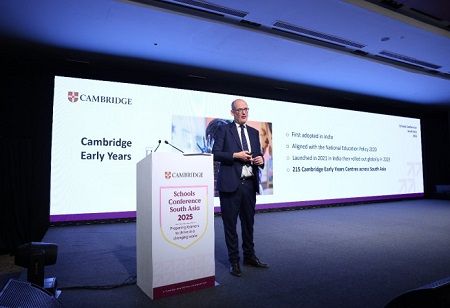- Cambridge University Press and Assessment organized the 2nd South Asia Cambridge Schools Conference with more than 400 teachers from India, Nepal, Sri Lanka, Bhutan, Bangladesh, and the Maldives.
- The conference was centered on teacher development, online testing, AI in education, and introducing programs such as Climate Quest, Cambridge Connect, and Young Pioneers to meet changing global educational demands.
- Cambridge restated its pledge to enable teachers and learners across South Asia, meeting the worldwide need for 44 million new teachers by 2030.
Cambridge University Press and Assessment's International Education group, Cambridge, organized its second annual South Asia Cambridge Schools Conference, gathering 400 educators, school and thought leaders from India, Nepal, Sri Lanka, Bhutan, Bangladesh, and the Maldives.
With the increasing demand for Cambridge qualifications in the region, the conference highlighted Cambridge's role in helping schools, teachers and learners navigate the fast-changing education landscape.
The conference is against the backdrop of a global need for 44 million new teachers by 2030. In response to this need, Cambridge emphasized its commitment to empowering the region's teachers through new professional development programs and qualifications, upskilling courses, pre-service teacher training, and short-term e-learning modules to expand its teaching capacity.
In his welcome address, Rod Smith, Cambridge's Group Managing Director of International Education, complimented school leaders throughout the region for collaborating with Cambridge to design curricula and resources, and launch new, innovative programmes that equip learners to be ready for the world. He added: "We're dedicated at Cambridge to readying learners to meet the rapidly changing world around us. In doing so, we empower educators through professional learning, implement digital examinations to accelerate assessment, and bring AI onboard to enrich learning. South Asia is emerging as an educational hotbed, and we're glad to be partnering with schools to establish new initiatives like Cambridge Early Years and Climate Quest that will inform the education landscape of the future in this region and more".
Vinay Sharma, Senior Vice President, International Education in South Asia, stated, "Our belief in making international education available and with the best standards of quality remains unshaken. We trust our schools to establish a firm foundation based on learning, teaching, and assessment. This conference is aimed at finding innovative means of collaboration to prepare learners to thrive in a world where rapid technological, social, and economic changes characterize it".
Cambridge's other main developments for students are Climate Quest for guiding climate resilience, Cambridge Connect, a programme to satisfy national high-stakes exam requirements, the March exam series to satisfy local admission requirements, Integrated Learning & Assessment for building English as a skill, and Young Pioneers to develop an entrepreneurial attitude.
Panel debates had amongst their notable speakers Mark Winterbottom, Professor of Education, University of Cambridge, Sarah Hughes, Head of Research, International Education, Cambridge, Sanjay Jain, Head of Google for Education, India, Lindsay Nadin, Director of Digital Products and Services, International Education, Dr Sue Brindley, Faculty of Education, University of Cambridge, Abigail Barnett, Director of Cambridge 3-19 Curriculum, Aynur Ismayilli Karakoc, Senior Impact Evaluator, CUPA, Kevin Ebenezer, Director, University Pathways and Progression, International Education, to mention but a few. Key programs were emphasized, such as Climate Quest, Cambridge Connect for national high-stakes tests, March exam series, Integrated Learning and Assessment for building English as a skill, and Young Pioneers for entrepreneurial mindset from the region.
The sessions focused on applying AI in the classroom, computer-based high-stakes testing, and future career paths. Major issues addressed included influencing mindfulness in schools, transforming college readiness to meet changing career paths, and equity in accessing quality education. Throughout the conference, the Cambridge School Recognition Awards, awarded to a number of schools, acknowledged academic achievement.

